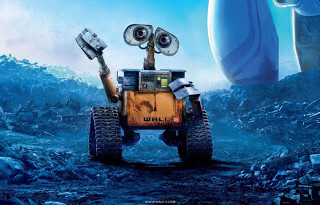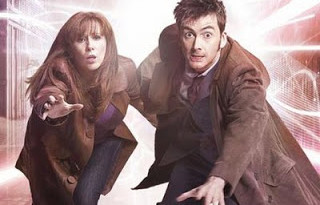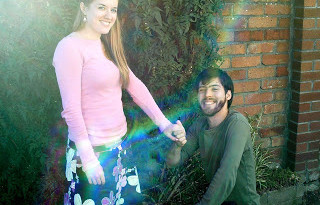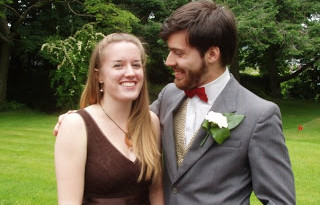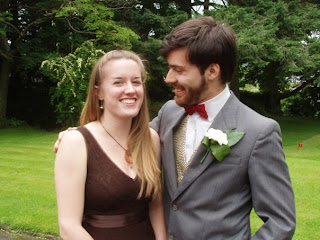 Beverley & me at Rich & Becky’s wedding last weekend
Beverley & me at Rich & Becky’s wedding last weekend
To cut a long story short:
On Saturday 19th July, around one o’clock in the afternoon, I got down on one knee and asked my wonderful girlfriend Beverley Watling if she wants to marry me. She said yes, so we’re now engaged!
To cut a short story long:
Saturday, 9:30am
I open my eyes, and have the clear rush of thoughts that follow a sudden waking from a good night’s sleep:
Curtains.
Sunlight.
Morning.
What’s the time?
My watch.
9:30.
Not too early. Not too late.
Sunshine – yes! Perfect.
Action stations.
I leap out of bed, and pull open the top draw of my desk. I take out a box, and flip it open. I hold the box in the shaft of sunlight coming through the gap in the curtains. The contents of the box glints and reflects the morning rays.
A silver ring – white gold, to be precise – lies there, a diamond snugly sitting against its perfect circle. In the light, the stone looks as if fireworks are frozen in a fragment of ice.
But it’s not the sight before my eyes, but the image in my mind that makes me smile: Beverley Watling. It’s ten months and two days since I started going out with her, and getting to know her better and falling more and more in love with her has seemed a remarkably easy process. I’m due to go round to her house for 11:30am, and we need to go shopping and be back at my house by two.
In the last few weeks, I’d considered all sorts of madcap schemes and hair-brained stunts. A surprise appearance as she visited her parents in North Wales, a treasure hunt across Cardiff, writing my love in letters in the sky… But too much could go wrong, and it needs to be perfect. I need to keep it simple. I need only three things.
Item number one: sunshine. I pull the curtains fully open onto the glorious morning. I’m good to go.
11:00am
I leave the house, beard trimmed, hair washed, thoroughly clean and sweet-smelling. Today of all days it’s important to reach female-friendly levels of personal cleanliness, rather than my default lower levels of male-friendly cleanliness.
From my pocket, I take a scrap of paper, on which are written many words. Words of appreciation, of admiration and of love. Jotted down last night. I mean every one of them, but I crumple up the paper without looking at it again. When I speak, my words must not come from a script, but come from my heart.
Item two: sincerity.
11:10am
A slight detour to the shops. I duck into a supermarket. I’m distracted for a moment by the “Reduced for Quick Sale” trolley – are there any cakes in there? But that’s not why I’m here. I make my way to the far aisle, and examine the rows and rows of unfamiliar bottles. I take one, and head for the checkout.
Item three: champagne.
I don’t really need it, of course. But it’s suitably celebratory, and “Love is not love that stops at duty’s end.” (I think I made that one up. With apologies to Shakespeare, of course. I ought to write it down while I still remember it.)
The ring is in my pocket, and the three vital ingredients are in place: sunshine, sincerity and champagne. What can possibly go wrong?
11:15am
The clouds are darkening. I feel the first spots of rain.
Please God, bring out the sun again quickly!
11:25am
I ring the bell of Bev’s house. Vicky answers the door – Bev is still in the shower. I chat with her in the living room, glancing out the window at the sky every ten seconds.
11:40am
Beverley comes down the stairs, dressed but with her hair wrapped up in a towel. She makes me a cup of tea and tells me she needs to finish getting herself ready – drying her hair, putting on her make-up. That won’t take too long, will it?
12:30pm
Three quarters of an hour later… the weather is no better, and Bev seems a bit stressed out. She remembers she needs to hang her washing up to dry, and suggests I go to Lidl while she does so to save time, and to give her space to de-stress.
If she’s feeling like that, and if the weather isn’t getting better, perhaps this isn’t the best time to pop the question? Crestfallen, I make my way to Lidl and ask God for wisdom. Should I put it off until another time? If I do, where will I conceal the champagne?
The skies open with a torrential downpour that would make Noah nervous.
12:55pm
Two cartons of fruit juice, a jar of honey, a couple of packets of crisps, a frozen pizza, some biscuits and a bag of apples later, I emerge from Lidl. The wind is blowing, and the rainclouds are disappearing rapidly towards the horizon. White fluffy clouds billow across the blue skies above, and the Hallelujah chorus plays triumphantly in the background, in my mind at least.
Things are looking up!
1:05pm
I arrive back at Bev’s house. She’s almost ready to head back round to my house in time for lunch and people possibly arriving from two. I ask her how she is now, and she tells me she’s feeling better. I suggest we step out into the garden a moment.
Beverley looks beautiful, the sun catching her light-brown hair, making it radiant, her face happy and smiling. I hug her to me, and tell her how much I love her, care for her and enjoy her company. I say how wonderful the last ten months and two days have been. I could go on for ages, but I’m sure she can guess what’s coming. I get out the box, and open it to reveal the ring.
“Miss Beverley Hannah Watling, will you marry me?”
I realise I’ve forgotten to get down on one knee, and hurriedly do so mid-sentence. But she’s already giving her answer, her face beaming with happiness.
“Yes!”
She puts on the ring. I laugh, and swing her round, hugging her to me. I show her the bottle of champagne, and we kiss and laugh, as excited as we’ve ever been in all our lives.
 Last week Bev and I went to watch Wall-E, a love story about two robots. Wall-E has been left behind to clean up Earth, which has been abandoned due to all the pollution and rubbish, but then he meets a sleek “female” robot called Eve, who’s a bit like a Mac to his PC.
Last week Bev and I went to watch Wall-E, a love story about two robots. Wall-E has been left behind to clean up Earth, which has been abandoned due to all the pollution and rubbish, but then he meets a sleek “female” robot called Eve, who’s a bit like a Mac to his PC.
